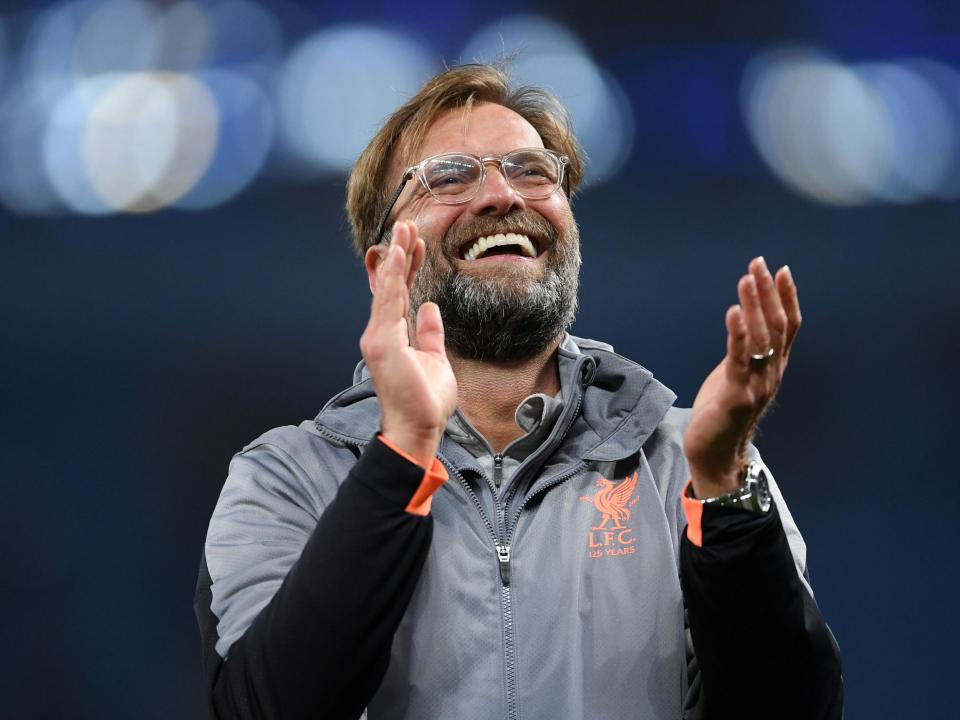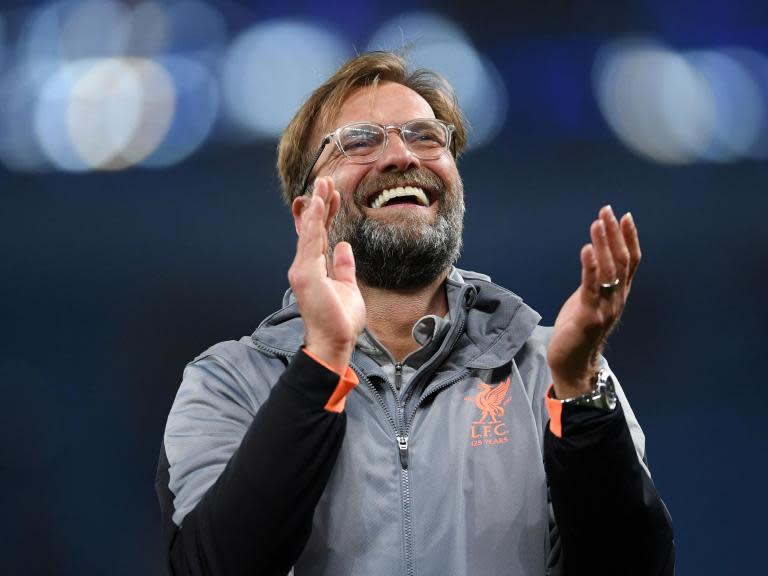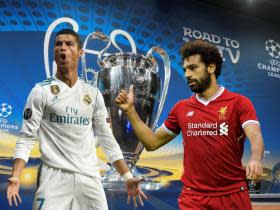Champions League final: Jurgen Klopp truly believes that Liverpool are back – and if he is right, it’s all down to him
“We are back,” Jurgen Klopp would twice declare in the body of the same answer after it had not taken him long to contemplate whether Liverpool’s mere presence in a European final confirms the club as being great again.
Spend any amount of time in Klopp’s company and you believe his message. Even the zaniest conspiracy theorist on social media would find it hard not to trust him. Listen to Liverpool’s players when they speak about the atmosphere between them and you appreciate quickly that Klopp’s personality and values are now central to their own.
Even though John W. Henry’s comments about standards in La Liga might be true, timing is everything. Liverpool have made enormous strides but under Klopp they have won nothing yet. With Real Madrid standing in front of them, Henry’s words act as a reminder: it’s a good job he appointed Klopp to the task of sorting out his club because the German is still one of only a few people involved in genuinely key decision making positions who really knows about the potential dangers of reactions from rivals.
READ MORE: Liverpool to step up pursuit of Nabil Fekir
READ MORE: Why Sadio Mane bought 300 Liverpool shirts for his village
Structure helps but imagine a Liverpool without Klopp. He has inspired what seemed impossible last August when Liverpool had to qualify for a competition they are now one game away from winning.
It is worth remembering that in Champions League history, only two teams including Barcelona have progressed from the pre-group stages to lift the trophy. Liverpool had been the first in 2005. This club would feature as runners-up in another final two years later and until 2009, Liverpool’s belligerence and cunning made them one of the sides to avoid in Europe.
If Liverpool are back, you have to assess where they’ve travelled from. The path to this point of notoriety has been disrupted by many rocks. The threat of administration in 2010 could have been a crevasse from which it would surely have taken even longer to climb out of.
To put it in a historical context for those of a certain age, 11 years have been since Liverpool’s last Champions League final, the same length of time that passed between the club’s last league championship in 1990 and 2001, the year it emerged from the shadows under Gérard Houllier, winning five trophies. Between 1990 and 2001, indeed, Liverpool lifted an FA Cup and a League Cup. There has only been a League Cup since 2006 – and though the period has included runs to four finals as well as a narrow league championship miss – if a book was to be written about the era, Paradise Lost would be an appropriate title.
Over the last week, various figures including captain Jordan Henderson have tried to be precise about the turning point which set Liverpool spinning in this new trajectory under Klopp. Surely, the story begins in Madrid – which provides a convenient arc ahead of this final. Brendan Rodgers would have one or two more reasonable days after getting this one terribly wrong but a Champions League group stage fixture at the Santiago Bernabéu in 2014 was meant to signal Liverpool’s return to the grandest table in football. Instead, decisions only served to remind just how far away they were from sitting there regularly.
It is true Real had roasted Liverpool at Anfield a few weeks earlier but in choosing to field a weakened side in the Spanish capital, Rodgers not only signalled to his players they were not good enough, he also stole them of the sort of opportunity footballers dream about as children. Raheem Sterling was one of them and suddenly, he was considering a future elsewhere.
To Liverpool’s supporters, meanwhile, the decision suggested he did not have a plan and to those who doubted him already, it reeked of self-preservation: of getting your excuses in first. Rodgers might have been able to fight against that argument had he found a way to beat Chelsea with a full-strength team the following weekend but at a dank Anfield, Liverpool lost quite easily. Thursday marked the third anniversary of Liverpool’s humiliating 6-1 defeat at Stoke under Rodgers in the final day of that season. He would survive until the following October when he was replaced by a more consistent and believable character. It is unimaginable that Klopp would bend his beliefs in the face of criticism – and plenty has come his way already. By insisting Liverpool are relevant in European terms regardless of what happens in Kiev, he is not saying that Liverpool are simply pleased to be there. He is placing pressure on himself. He is saying there will be other finals under his watch, though this one might prove to matter the most in the context of time.
“I think it is obvious we are back,” Klopp rationalised “That is absolutely (obvious). To qualify for a final, it shows that you are back. To win it? You need a little bit of luck and stuff like that is involved. But we are back. First and foremost. To win? It would be just great. We really don’t need (the trophy) to show how good we are. We have shown how good we are. Now we have to win the game. We have to continue on the way. Even if you win, you cannot stop. If you lose, you cannot stop…”
When Klopp looks into his crystal ball, he sees only a golden future at Anfield – win or lose in Kiev. His confidence is public and it is unusual. He offers hope whereas others in his profession do not, even though they are in a position to. He is more realistic than Houllier, who in 2002 would claim Liverpool were only “10 games from greatness,” but he is sensible enough to not go full-Shankly by claiming it his ambition to “conquer the whole bloody world” even though inwardly you sense he thinks it might be possible.
“Yes, 100 per cent,” Klopp responded when asked again about the final representing the start of something special. “We feel in a good place. Not in a place to rest or whatever. No. Not at all. This is really a good place to use. We spoke about the base before the season and I think apart from a few moments that were not brilliant, the boys have been brilliant to get us in to the situation we are in now. We have done that together and we go through it together. We don’t have to think about a draw too much or if we lose 1-0, that it will be ok. We only have one thing to think about how can we win the game…and the good thing already is that we know it is possible…”
“We know, of course, about the quality (of Madrid),” he continued. “The crazy quality, the experience. The Villarreal game [last weekend], it was a show of confidence, of all how you play football. Villarreal wanted to play football but they couldn’t. They were 2-0 up and then they closed the game too early. It was a different game second half. That is their quality. But we are Liverpool. And that is what we will really live in that moment. We are Liverpool. We are different. We have been different the whole campaign and we want to be different again in that final. We have a chance. That is all.”
The mood contrasts with 2016, when ahead of the Europa League final against Sevilla, enthusiasts were swept away in Kloppism, ignoring the sharp reality that the opponent had an impressive track record of success in the competition and were actually the outstanding favourite. This time, Liverpool take the role of the underdog – and it is a role that has suited them in the past when collective desperations to prove doubters wrong have seen giants toppled. You can attach style to identity and admire his team’s fearlessness but Klopp is relating to something fundamental in the Scouse psyche when he repeats that “we are Liverpool,” as if that alone makes anything possible because of the sheer will that emits from the most determined spots in the city.
“…the history of this club shows you it is possible to win things, it’s not that you need to be the most special manager in the world,” he said, raising his voice. “This club gives you the power, the players, the teams that you can win from time to time big things. That is true. If you ask whether Real Madrid was the best team in the world all the time that they won the Champions League twelve times? Probably not. But they still won it. It was the same when Liverpool won these big prizes. Where they the best team in the world? Probably not. But it was possible because of the power and the size of the club.”
Klopp has never won the Champions League but if he does with this team, it will shatter the idea money is the route to all success in football. Klopp has had money, of course – with funding available to him that he never had at Dortmund. Yet he has adjusted to the difference and he has been unfailing in his judgement whenever he has spent, which has not always been a lot anyway. Klopp would be the manager who sold his star player without replacing him but still found a way to achieve something all but one of his predecessors since Joe Fagan have not been able to do, and that includes a list of managers who have frittered away millions in pursuit of what was ultimately impossible for them to achieve. If Liverpool supporters are revelling in the fact Klopp is disturbing accepted notions that are so utterly demoralising, then so is he. He would describe what it has been like for him this season, and the pleasure he has taken in seeing the reactions to his team’s performances.
“The home games were like, ‘Wow, what’s that?’ It was kind of a new level in the Champions League. It was not that we are so much better, but it was so different, so brave. It was big balls football…I really loved it!”
These are words and memories, indeed, that make Klopp’s Liverpool unique. It is because of him, maybe they are back.

 Yahoo Sport
Yahoo Sport 








































